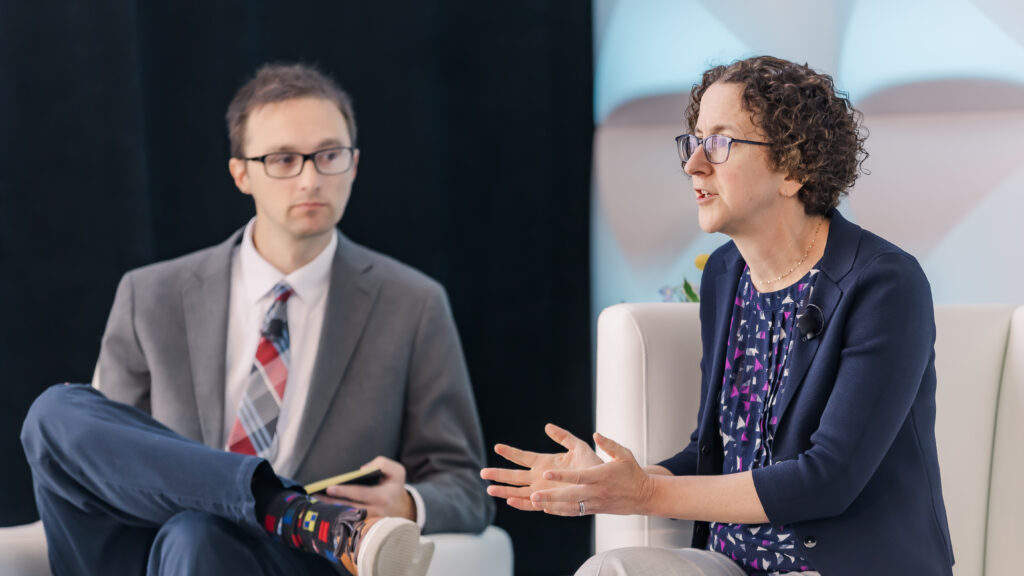Fixing the U.S. health care system can seem like a herculean task. But the solution is “actually very simple,” according to Massachusetts Institute of Technology economist Amy Finkelstein.
In their recent book “We’ve Got You Covered: Rebooting American Health Care,” Finkelstein and Stanford economist Liran Einav describe how years of research have led them to the conclusion that the best way forward is for the U.S. to offer universal basic health care coverage.
advertisement
Speaking at the STAT Summit in Boston last week, Finkelstein explained that the reality of the current U.S. health care system is that taxpayers already wind up footing the bill when people are unable to pay for the costs of their medical treatment.
“We’re already paying as taxpayers for universal basic automatic coverage, we’re just not getting it,” Finkelstein told STAT reporter Bob Herman at the summit. “We might as well formalize and fund that commitment upfront.”
As she envisions it, basic health coverage — which can be provided by a single payer, or a multiplicity of private ones, depending on the policy design — could be provided to all Americans automatically, without raising taxes. “In the U.S., half of our health spending is taxpayer-financed. If you add that all up, that’s 9% of GDP. That’s as much as other countries are spending” on universal health care, Finkelstein said.
advertisement
The system she proposes wouldn’t involve copays or deductibles, either. Long heralded by health economists (including Finkelstein) as the antidote to unnecessary health care use by compelling people to have financial “skin in the game,” newer research has shown that because countries wind up providing exemptions to a wide range of people — from people living in poverty to older adults, students, people with disabilities, and those undergoing cancer treatments — they wind up creating more complications than benefits.
Finkelstein and Einav no longer see copays and deductibles as effective tools in keeping costs down. “We take it back, at least in the context of the universal basic components of the program,” said Finkelstein.
This would leave no one uninsured and eliminate the stress of losing coverage, which is a possibility even for people who do have insurance.
The operative word in this plan is “basic,” Finkelstein explained. The universal option wouldn’t cover all services, just the essential ones — as is the case in most countries with universal coverage. That is crucial for Finkelstein and Einav’s proposal to be sustainable.
“Of course, we’d all like a private hospital room. We’d all like to get to see the doctor tomorrow. But our view is that’s not part of the social contract of what is actually essential.” she said.
Countries are divided, however, on what constitutes basic services. There are services that are clearly fundamental (say: vaccines, primary care, cancer care, maternity care) and others that are definitely not (for instance, purely cosmetic plastic surgery). But Finkelstein noted that a lot of services fall into a gray area, such as physiotherapy, new drugs that only extend life expectancy for a few months, Viagra, and in vitro fertilization.
Narrowing down which categories this latter group of services fall under will be the work of policy debate, said Finkelstein. “It’s not a one-and-done decision. This is going to be a decision we’re going to constantly have to make as incomes grow, as new medical technologies get created, as notions of disease evolve,” she said.
When people want services that aren’t basic, Finkelstein said, the best option is to “allow people who are able to, and want to, to top up that basic floor through a well-functioning and well-designed supplemental insurance market.”
But while the plan may be simple, gathering the political will to implement it may be a more complicated proposal. “I’m pretty confident it’s not happening this week … we need to get a speaker first!” she said, referring to the ongoing efforts to elect a new House speaker. On a more serious note, she said: “Policy windows open unexpectedly all the time … we want to be ready when that window opens.”
Be it through one big reform or a series of incremental ones over the years, Finkelstein is confident her and Einav’s vision can gain momentum. “I’m full of hope,” she said.

